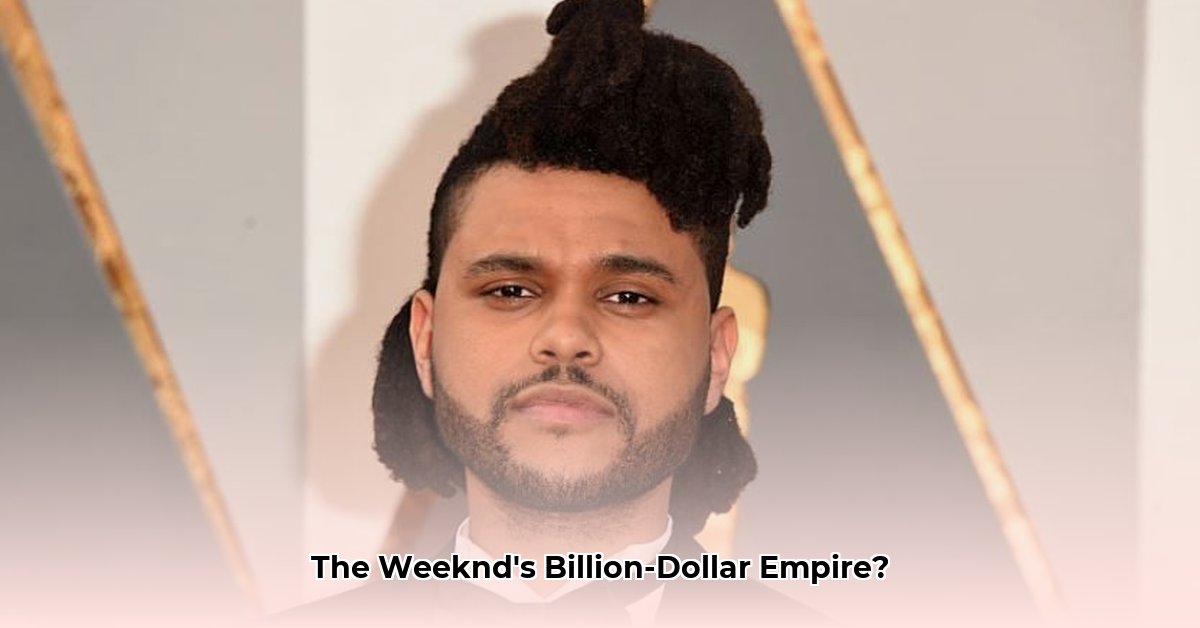
From uploading anonymous tracks to YouTube to commanding sold-out stadiums globally, Abel Tesfaye, known as The Weeknd, has built a financial empire. His journey is a compelling narrative of raw talent, astute business decisions, and strategic risk management. This article explores how he transformed from an online artist into a global music icon and amassed a substantial fortune.
The Rise of a Star: From Bedroom Beats to Global Anthems
The Weeknd's success wasn't overnight. His early days featured self-released mixtapes on YouTube, cultivating a devoted fanbase organically. This grassroots approach, rare in today's music industry, was a crucial foundation. These early tracks generated significant buzz, attracting industry attention, and ultimately landing him pivotal record deals. His unique sound and intense lyrics resonated with listeners, creating a loyal audience that propelled his career trajectory. Was this early organic growth the key to his later explosive success? Undeniably, his early fan base provided a springboard for greater opportunities.
Building an Empire: More Than Just Music
The Weeknd's empire extends beyond viral hits. Strategic partnerships with Republic Records catapulted his music globally. These weren't merely contracts; they were alliances that transformed his career. His music, complemented by striking visuals, resonated with millions, leading to immense streaming revenue. However, his acumen extended beyond music. He recognized the power of live performance, consistently selling out stadium tours, generating substantial income. Furthermore, he leveraged his brand image into lucrative endorsement deals with major companies like Puma and Bacardi, further diversifying his revenue streams. This multi-pronged approach transformed him from a musician to a multifaceted brand.
The Weeknd's Money Machine: A Breakdown of Income Streams
The Weeknd's wealth is fueled by several key income streams:
| Income Stream | Estimated Contribution to Net Worth | Key Factors |
|---|---|---|
| Album Sales | Very Substantial | Millions of albums sold globally, forming a strong foundational income. |
| Touring Revenue | Extremely Significant | Consistently sold-out stadium tours worldwide, a primary revenue source. |
| Endorsements | Very Significant | High-profile deals with Puma, Bacardi, and other brands. |
| Publishing Royalties | Substantial | Continuous income from songwriting, providing a stable revenue stream. |
| Merchandise | Significant | T-shirts, albums, and other branded merchandise contribute substantially. |
While precise figures are confidential, this breakdown illustrates the diversified nature of his financial success. These revenue streams function synergistically, amplifying his overall wealth.
The Challenges of Staying on Top: Risks and Mitigation
Maintaining The Weeknd's level of wealth presents ongoing challenges. The music industry's volatility—shifting trends, evolving tastes, and fierce competition—demands constant adaptation. Declining album sales and the rise of new platforms represent significant risks. His team likely employs proactive risk-mitigation strategies, including exploring new avenues such as NFTs or metaverse experiences. Diversification remains his most effective risk-management tool. How will he continue to innovate and evolve in this rapidly changing entertainment landscape? Only time will tell.
The Future: A Look Ahead
Predicting The Weeknd's future wealth is speculative. While his current model is highly successful, sustained dominance requires continued innovation. Maintaining relevance necessitates exploring new collaborations, meticulously managing his public image, and staying ahead of musical trends. This isn't just about preserving his fortune; it's about building a lasting legacy. His long-term vision, his ability to adapt, and his connection with his fanbase will shape his financial future. The evolving landscape of streaming and changing musical preferences will continuously test his resilience. The next chapter of his empire will depend on his ability to navigate this evolving environment.
How The Weeknd Diversified His Income Streams for Long-Term Financial Success
Key Takeaways:
- The Weeknd's success is a blend of musical talent and astute business decisions.
- He strategically built his brand, using mystery and careful image crafting.
- Diversification is key; he avoided reliance on music sales alone.
- Strategic collaborations amplified his reach and profits.
- His journey offers valuable insights for aspiring artists and investors.
From Mixtapes to Millions: Building a Foundation
The Weeknd's career began with strategic self-released mixtapes, building a loyal fanbase organically before signing with a major label. This controlled expansion allowed him to build his brand and set the stage for future growth. His early calculated moves, masked by an air of mystery, generated substantial interest.
Strategic Partnerships & Brand Building: Beyond the Music
The Weeknd's long-term financial success stems from strategic partnerships and brand expansion. Collaborations broadened his reach and generated additional revenue. His brand extends beyond music, encompassing endorsements, merchandise, and even acting roles, such as his prominent part in the HBO series, The Idol. This multimedia expansion greatly amplified his financial success.
The Multi-Faceted Empire: Exploring Income Streams
The Weeknd's wealth is multi-faceted:
- Music Sales & Streaming Royalties: His foundational income, continuously generated.
- Global Touring: Immense revenue generated from consistently sold-out concerts.
- Merchandise: A substantial revenue stream fueled by his clothing lines and branded products.
- Brand Endorsements: High-profile brand partnerships contribute significant income.
- Film and Television: Expanding his brand into acting broadened his revenue opportunities.
This diversified approach significantly reduces his reliance on any single income source.
Navigating the Risks: A Look Ahead
Risks remain: reliance on streaming revenue, maintaining his brand image, industry downturns. However, his diversification mitigates these risks. His future success will depend on continued adaptation to the ever-changing music and entertainment industry.